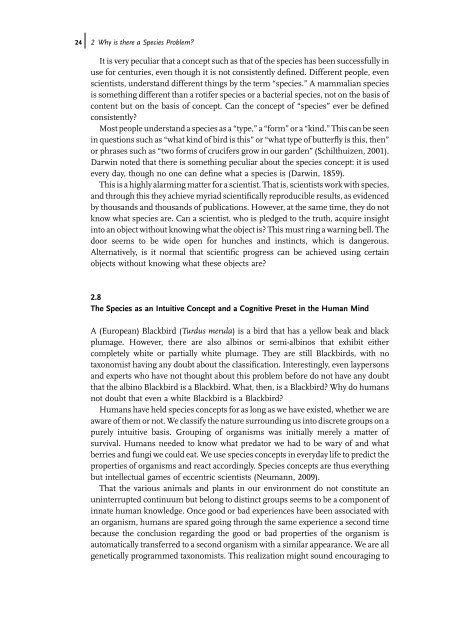Principios de Taxonomia
Create successful ePaper yourself
Turn your PDF publications into a flip-book with our unique Google optimized e-Paper software.
24j 2 Why is there a Species Problem?<br />
It is very peculiar that a concept such as that of the species has been successfully in<br />
use for centuries, even though it is not consistently <strong>de</strong>fined. Different people, even<br />
scientists, un<strong>de</strong>rstand different things by the term species. A mammalian species<br />
is something different than a rotifer species or a bacterial species, not on the basis of<br />
content but on the basis of concept. Can the concept of species ever be <strong>de</strong>fined<br />
consistently?<br />
Most people un<strong>de</strong>rstand a species as a type, a form or a kind. This can be seen<br />
in questions such as what kind of bird is this or what type of butterfly is this, then<br />
or phrases such as two forms of crucifers grow in our gar<strong>de</strong>n (Schilthuizen, 2001).<br />
Darwin noted that there is something peculiar about the species concept: it is used<br />
every day, though no one can <strong>de</strong>fine what a species is (Darwin, 1859).<br />
This is a highly alarming matter for a scientist. That is, scientists work with species,<br />
and through this they achieve myriad scientifically reproducible results, as evi<strong>de</strong>nced<br />
by thousands and thousands of publications. However, at the same time, they do not<br />
know what species are. Can a scientist, who is pledged to the truth, acquire insight<br />
into an object without knowing what the object is? This must ring a warning bell. The<br />
door seems to be wi<strong>de</strong> open for hunches and instincts, which is dangerous.<br />
Alternatively, is it normal that scientific progress can be achieved using certain<br />
objects without knowing what these objects are?<br />
2.8<br />
The Species as an Intuitive Concept and a Cognitive Preset in the Human Mind<br />
A (European) Blackbird (Turdus merula) is a bird that has a yellow beak and black<br />
plumage. However, there are also albinos or semi-albinos that exhibit either<br />
completely white or partially white plumage. They are still Blackbirds, with no<br />
taxonomist having any doubt about the classification. Interestingly, even laypersons<br />
and experts who have not thought about this problem before do not have any doubt<br />
that the albino Blackbird is a Blackbird. What, then, is a Blackbird? Why do humans<br />
not doubt that even a white Blackbird is a Blackbird?<br />
Humans have held species concepts for as long as we have existed, whether we are<br />
aware of them or not. We classify the nature surrounding us into discrete groups on a<br />
purely intuitive basis. Grouping of organisms was initially merely a matter of<br />
survival. Humans nee<strong>de</strong>d to know what predator we had to be wary of and what<br />
berries and fungi we could eat. We use species concepts in everyday life to predict the<br />
properties of organisms and react accordingly. Species concepts are thus everything<br />
but intellectual games of eccentric scientists (Neumann, 2009).<br />
That the various animals and plants in our environment do not constitute an<br />
uninterrupted continuum but belong to distinct groups seems to be a component of<br />
innate human knowledge. Once good or bad experiences have been associated with<br />
an organism, humans are spared going through the same experience a second time<br />
because the conclusion regarding the good or bad properties of the organism is<br />
automatically transferred to a second organism with a similar appearance. We are all<br />
genetically programmed taxonomists. This realization might sound encouraging to



